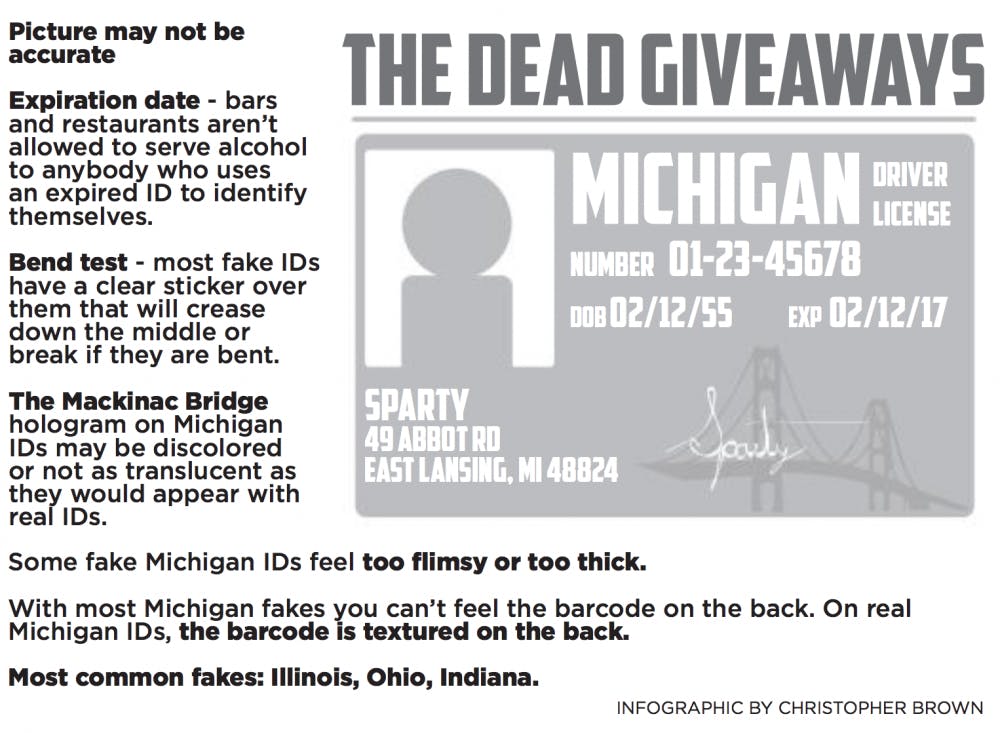
Local bars and ELPD explain what happens when students use fake IDs

Underage students looking to get into bars could see legal action taken against them if they use fake identification, police say.
Each year, bouncers, bartenders and servers confiscate fake IDs from minors who try to get into bars. Though when most fakes are taken, not much legal action is taken by the police.
For the most part.
“If someone tries to get into a bar with a fake ID it falls within our disorderly conduct code,” ELPD Lt. Steve Gonzalez said.
“If the individual stuck around and the officer takes some kind of enforcement, the ID will be confiscated and placed into evidence, as evidence in the potential criminal case that would be upcoming in court,” Gonzalez said. “If the person left and the bar simply confiscated their ID, what they’ll do is eventually they’ll turn those IDs over to the police department.”
Once the bar hands over the fakes to police, Gonzalez said ELPD mainly uses the IDs for training purposes.
According to Gonzalez, ELPD also has an officer who acts as a liaison to bars and restaurants across the city. Once a fake ID is taken and given to police, it’s catalogued to distinguish trends among fakes over the years.
“So that officer will take those IDs and kind of catalogue them and track them: one so we can track them and see where these IDs are coming from,” Gonzalez said. “What’s the prevalent trend, is it a state of Maryland ID, state of Michigan ID, that type of stuff to see where most of the fake IDs are coming from. From year-to-year that seems to vary a little bit, which state is being used the most.”
Michael Krueger, general manager at Crunchy’s, said there are many ways to distinguish whether or not an ID is fake, but wished not to discuss the exact methods.
“We just kind of stay updated on all the out-of-state stuff and look for the differences in ... the newest ones,” he said. “There’s always new ones coming out for each state, and the fakes are getting better and better but they all have their little tells.”
In order to stay on the same page for responsible liquor serving practices, bars from across the city team up with police and community officials to form the East Lansing Responsible Hospitality Council, or RHC.
READ MORE
Andrew Poole, MSU staff liaison for the RHC, said members of the RHC will be conducting a training with ELPD on techniques to catch fakes from entering bars and restaurants.
Poole thinks it’s more important than ever to crack down on fakes because of the technology that’s available to replicate actual IDs.
“It’s getting more and more challenging because of the graphic design stuff that’s available on the internet and the price you can pay on the internet to get something printed out, so they have to be on their toes with it,” he said.
Kreuger, who’s also on the executive committee on the RHC, said he prefers to not get the police involved, but has no problem doing so if the minor trying to get in is being rude to his staff.
“If the person is a real jerk about it, then I have the option to turn it in to East Lansing Police and they can follow up at a later time,” Kreuger said. “We do that with out-of-state fake IDs, we do that with Michigan IDs, we do it with whatever. Ideally we don’t want to turn it into the police, but as long as you’re cool about it then we’ll just cut it up and throw it away.”
Per East Lansing ordinance, the only way a minor would find themselves in a bar would be through the lack of a better judgement from bouncers or through an attempted bribe.
Support student media! Please consider donating to The State News and help fund the future of journalism.
Gonzalez said East Lansing Police has been involved in a sting operation where undercover officers will try to order alcohol with an underage ID. If they receive the booze, an officer will write a citation, where fines can be levied against the individual who gave the minor access to the booze, or to the establishment itself.
“If the individual employee that is checking IDs, or that’s their primary responsibility to either let them in the bar or if it’s a situation where they don’t have someone at the door and there’s a bartender that’s responsible for checking IDs before they serve someone alcohol, both that individual can be cited for a liquor control violation,” Gonzalez said.
“It’s the chief’s sole discretion as to whether or not that violation is sent into the Michigan Liquor Control Commission so they can issue a formal violation against the establishment.”






